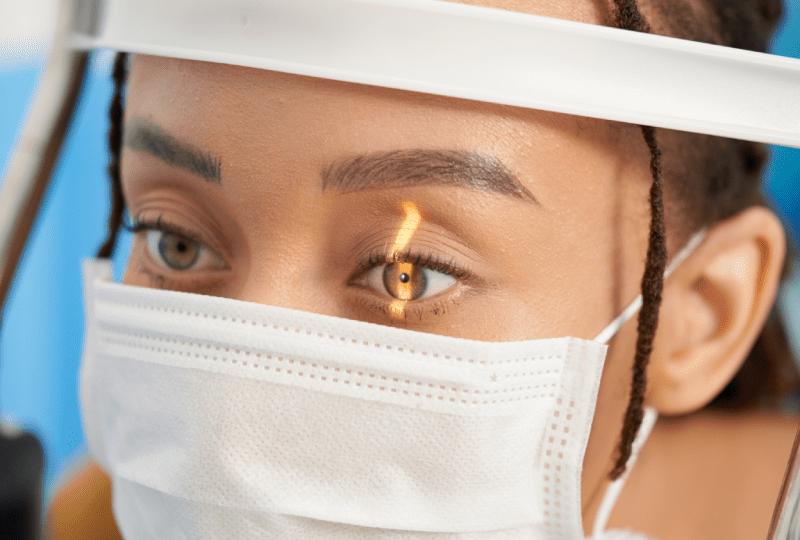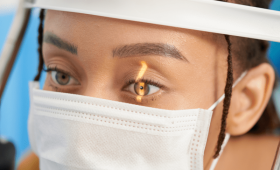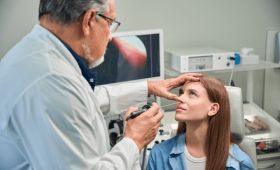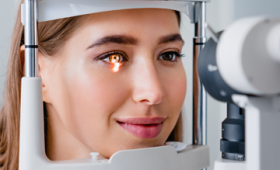What Is The Average Cost Of Laser Eye Surgery In Turkey?
The average cost of laser eye surgery (Femto-LASIK) in Turkey is one-third to one-half the price of equivalent operations in European countries. This cost varies according to the type of laser technology used (Femto-LASIK is more expensive), the scope of the package (accommodation and transfer included), and the city where the clinic is located. However, this price advantage allows patients to receive high-quality laser surgery without straining their budget. Readers can contact Cure Holiday for the most suitable, transparently priced packages and decide to receive treatment in Turkey.
Why Are Laser Surgery Prices So Much Lower Compared To Europe?
The main reasons why laser surgery prices are so low in Turkey are the low general operational and personnel costs and the high value of foreign currencies against the Turkish Lira (exchange rate advantage). Turkey reduces unit costs thanks to the high case volume and passes this saving on to patients. Even if the laser devices and consumables used in the surgery are at international standards, low operating expenses keep the prices attractive.
How Does The Exchange Rate Advantage Affect The Patient’s Total Budget?
The high value of foreign currencies like the Euro, Pound, or Dollar creates a significant increase in purchasing power for patients coming from abroad. Patients can purchase surgical and technological services that are expensive in their own countries due to high labour costs at a much more affordable budget in Turkey. This economic situation allows the patient to easily cover not only the treatment cost but also travel, accommodation, and transfer expenses.
Are Accommodation And Transfer Services Included In The Surgery Packages?
Clinics and hospitals focused on health tourism generally offer comprehensive packages for the comfort of international patients. These packages may include VIP airport transfers and accommodation in 4 or 5-star hotels during the treatment period, in addition to the surgery cost. These “all-inclusive” services ensure the patient focuses solely on the treatment without logistical stress in Istanbul or other major cities.
How Much Does The Cost Of Femto-LASIK Technology Differ From Standard LASIK?
The cost of Femto-LASIK (bladeless laser) technology is higher than the traditional (mechanical blade) LASIK method. This difference stems from the high investment and operational cost of the Femtosecond laser device. However, Femto-LASIK is preferred by specialists because it is safer, creates a more precise flap, and carries less risk of dry eye. This advanced technology is offered in Turkey at a cost even more affordable than the standard LASIK prices in Europe.
Is The Guarantee Of Getting Rid Of Glasses Included In The Fee?
The main goal of laser surgery is for over 98% of patients to achieve glasses-free clear vision. Reliable clinics offer a free touch-up (Touch-Up) guarantee within one year in case a small prescription remains (regression). This guarantee demonstrates confidence in the surgical success. However, the natural difficulty in seeing near objects (presbyopia) that occurs after the age of 40 does not mean the surgery has failed and may require additional lens solutions.
Is A Price Difference Applied For High Eye Prescriptions?
In laser eye surgery, the price is generally determined according to the type of laser applied (Femto-LASIK/PRK), and no significant price difference is usually applied for high eye prescriptions (e.g., over -8.00). However, if the patient has a high prescription and an insufficient thin cornea, the more costly ICL (Intraocular Lens) treatment may be recommended instead of LASIK, which significantly increases the total cost. The specialist balances the patient’s safety and budget when determining the most suitable method.
Are Detailed Tests Performed Before Surgery Included In The Fee?
Yes, the fees for all mandatory tests and examinations before laser surgery, such as corneal thickness (pachymetry), corneal map (topography), eye pressure, and fundus examination, are included in the laser package price offered by reliable clinics. These tests are vital for safely planning the surgery. Patients can decide to receive treatment in Turkey by ensuring that these diagnostic phases are fully included in the fee.
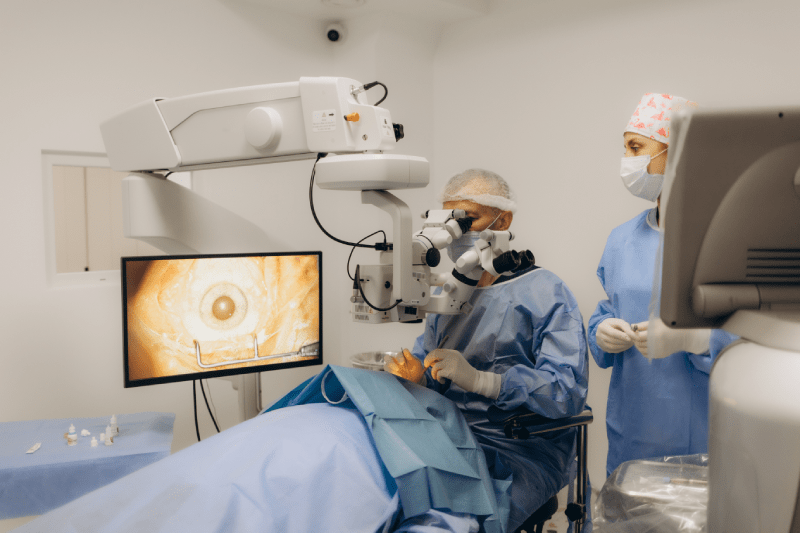
Are Medications And Drops Used Post-Surgery Included In The Package?
Yes, all antibiotic and cortisone eye drops and painkillers that must be used during the post-operative recovery period are included in most comprehensive packages. This service eliminates the patient’s need to search for extra medication in Turkey. Regular and correct use of the drops is critically important for preventing infection risk and accelerating healing.
What Are Potential Hidden Extra Costs And How Can They Be Avoided?
Transparent corporate clinics avoid hidden costs. However, extra costs that may rarely arise include: 1) The mandatory fee for switching to ICL lens because the cornea is too thin, 2) The cost of extra specialist consultation for an uncontrolled chronic disease (like diabetes), 3) The cost of long-term artificial tear drops that may be needed rarely. These risks are determined during detailed pre-operative tests, and the patient should be informed about these possibilities beforehand.
What Is The Safest Laser Surgery Technique?
The Femto-LASIK (bladeless laser) technique is generally considered the safest laser surgery technique. This method uses a Femtosecond laser instead of a traditional blade to create the flap (cornea cover). This ensures the flap is more precise, smoother, and more customized to the patient. Safety is maximized when combined with the quality of the device (Wavefront feature) and the surgeon’s high experience. Expert centers in Turkey use this technology as standard.
How Does The Experience Of Eye Surgeons Affect The Success Rate?
Laser eye surgery, no matter how advanced the device, depends on the surgeon’s experience and precision. Eye surgeons in Turkey have international levels of experience far beyond standards due to the high volume of health tourism cases. An experienced surgeon is more successful in flap creation, laser planning, and managing rare complications. The surgeon’s experience is the greatest assurance that the surgery will be safe, accurate, and the results will be permanent.
What Is The Most Suitable Age Range For Laser Surgery?
The most suitable age range for laser surgery is between 20 and 40, where the eye prescription is stable. Surgery is generally not performed on patients under 18 due to the risk of prescription change. After the age of 40, near vision difficulty (presbyopia) begins, and patients may be directed to Presbyopia laser or lens treatments. This is the natural aging process and does not mean the surgery has failed.
When Is Visual Acuity Achieved After Surgery?
After LASIK surgery, patients achieve significantly improved visual acuity even at the first check-up performed the next day. Vision rapidly begins to clear from the first day, and patients can return to their daily activities. Achieving full and final visual acuity and complete eye adaptation may take a few weeks to a month. This rapid recovery process is a major comfort for patients who decide to receive treatment in Turkey.
Is LASIK Surgery A Painful Procedure And How Is Anaesthesia Administered?
No, LASIK surgery is a completely painless procedure thanks to the eyes being brought under local anaesthesia with numbing drops. The patient only notices the light of the laser device and may feel slight pressure on the eye during the surgery. Mild stinging or watering may occur in the first few hours post-surgery, but this condition is easily controlled with prescribed painkillers and usually passes within a few hours.
When Is Air Travel Permitted After Surgery?
Since laser eye surgery does not significantly affect eye pressure, patients can safely fly immediately after the mandatory first-day check-up (usually 24 hours after the surgery). This allows patients to utilize their short stay in Turkey efficiently. However, it is recommended to use artificial tear drops regularly during the flight to reduce the risk of dry eyes.
In Which Cases Is Intraocular Lens (ICL) Recommended Instead Of Laser?
ICL (Intraocular Lens) implantation is recommended for patients with very thin corneas, prescriptions exceeding safe laser limits (e.g., over -10.00), or advanced dry eyes. ICL does not remove corneal tissue and provides high-quality vision by placing a permanent contact lens inside the eye. This advanced technology solution is successfully applied in expert eye centers in Turkey.
How Long Does The Risk Of Dry Eyes Last After Surgery?
Temporary dry eyes are common after laser surgery and generally resolve completely within a few months. Modern Femto-LASIK methods have reduced this risk. Physicians prescribe intensive moisturizing (artificial tear) drops to manage this temporary condition. The eye dryness test performed before surgery helps identify and manage this risk.
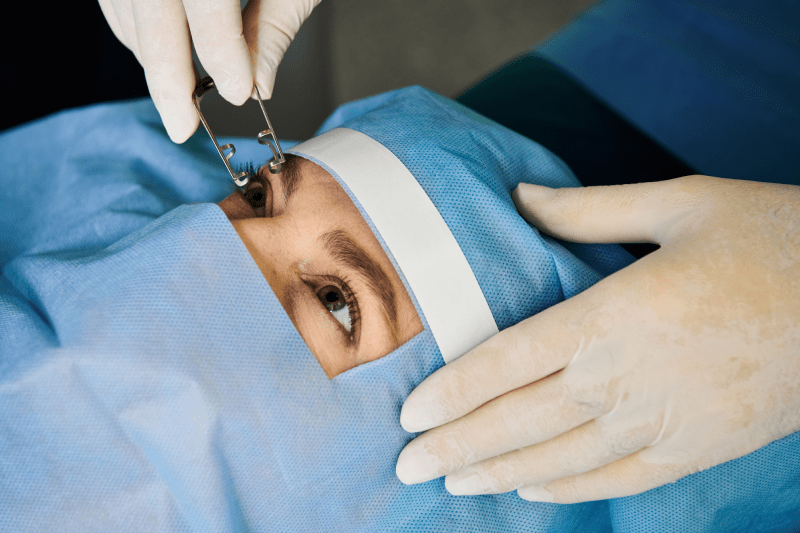
Why Must Lens Use Be Stopped Before Surgery?
Contact lens use must be stopped before laser surgery (soft lenses at least 1 week, hard lenses 2-4 weeks) because lenses change the natural shape of the cornea. This preparation is critical for the cornea to return to its original shape, allowing accurate and correct pre-operative measurements. Incorrect measurements can lead to incorrect laser planning and ultimately, failure.
How Is The Complication Risk Of Laser Surgery Minimized?
The complication risk of laser surgery is minimized by choosing an expert surgeon using Femto-LASIK like advanced technology. Detailed pre-operative corneal mapping, avoiding at-risk patients (thin cornea), ensuring sterile operating room conditions, and the patient strictly adhering to post-operative instructions minimize the risk to almost zero.
What Is The Average Duration Of Stay Required In Turkey For Treatment?
Patients coming to Turkey for myopia laser surgery are recommended to plan for an average stay of 3 to 4 days for a safe recovery process and mandatory check-ups. This period is sufficient for detailed pre-operative tests, the surgery day, and the mandatory first post-operative check-up. This short accommodation period allows patients to quickly return to their work or social lives.
Why Should Istanbul Or Izmir Be Preferred For Getting Rid Of Glasses?
Istanbul and Izmir are the most suitable cities due to their international accreditations, high case experience of surgeons, and access to advanced laser technology. Istanbul offers a wide network of clinics and logistical convenience, while Izmir combines high-quality treatment with the comfort of rest. Cure Holiday collaborates with the best centers in these cities, directing patients to the right specialist.
What Should Be Done And Avoided On The First Day After Surgery?
On the first day after surgery, it is vital for the patient to rest absolutely and strictly avoid rubbing their eyes or contacting them with water. The protective glasses or shield recommended by the surgeon should be worn. Heavy physical activities and intense light exposure must be avoided. This first 24 hours is the most critical phase for the flap to settle, and adherence to these rules guarantees success.
When Can Driving Be Resumed After Surgery?
The time to resume driving depends on the patient’s visual acuity meeting legal limits and the physician’s approval. Most patients achieve the clarity to drive one or two days after the surgery, but night driving should be postponed until vision stabilizes. The final approval given by the physician in Istanbul during the first check-up appointment is critical for safely resuming driving.
How Mandatory Is The Use Of Sunglasses After Surgery?
The use of sunglasses (UV protected) is absolutely mandatory after surgery, especially for the first month. Glasses protect the eyes from UV rays, dust, and wind. Since the cornea is sensitive to UV light during the healing process, failure to protect it may lead to slower healing or permanent scarring. Wearing a protective shield on the first night also prevents flap slippage.
When Can Sports And Swimming Be Resumed After Surgery?
Light exercises and walks can usually be done after 2-3 days. However, heavy sports that pose a risk of impact to the eye and swimming (sea, pool) activities should be avoided for at least 2 weeks (preferably 1 month). Water and sweat getting into the eye can increase the risk of infection, so waiting for the physician’s permission is crucial.
How Long Is Eye Makeup And Lens Use Forbidden After Surgery?
To prevent the risk of infection, eye makeup (mascara, eyeliner, shadow) and contact lens use are generally prohibited for at least 1 week (preferably 2 weeks). This period is necessary for the corneal flap to fully settle in place. Patients must also strictly avoid rubbing their eyes during this period.
How Do Chronic Diseases (Diabetes Etc.) Affect The Surgery?
Uncontrolled advanced diabetes like chronic diseases increase the risk of infection and slow down wound healing. Physicians mandate controlling the patient’s blood values before the surgery and may postpone the surgery until these values are within acceptable limits. This precaution is taken to maximize the safety and success of the surgery.
In Which Cases Is Laser Surgery Inapplicable?
Laser surgery cannot be applied to those with very thin corneas, corneal diseases like keratoconus, uncontrolled diabetes, pregnant or nursing women, or young people under 18 whose eye prescription is still changing. Experts in Turkey detect these risks through detailed tests and offer alternatives like ICL lens to unsuitable patients.
Why Is ICL Intraocular Lens Surgery More Expensive?
ICL (Intraocular Lens) surgery is more expensive than LASIK because it is a surgical procedure where a special lens is placed inside the eye instead of reshaping the cornea. The cost difference stems from the high production cost of the lens, the necessity of performing the surgery in a hospital environment (operating room), and the requirement for longer specialization. ICL is the safest solution for very high prescriptions.
Will Long-Term Computer Use Cause Problems After Surgery?
Long-term computer use does not cause a direct problem, but it may trigger dry eyes after surgery. Physicians recommend taking frequent breaks, blinking regularly, and using moisturizing drops to prevent this. With these simple precautions, patients can return to their daily computer use quickly.
Is Pre-Operative Dry Eye Treatment Necessary?
Yes, treatment of existing dry eyes before the surgery is mandatory. The physician will not perform the surgery without controlling the dryness with special drops or medications. This pre-treatment speeds up the post-operative recovery process and minimizes the risk of permanent dryness.
Is There A Guarantee For Refund Or Revision If The Surgery Fails?
Institutional clinics generally offer a free correction or revision surgery guarantee if the LASIK surgery fails. However, a refund guarantee is not common. The physician determines the patient’s suitability for the surgery beforehand, maximizing the success rate. Cure Holiday ensures that all warranty conditions are clearly set out before the surgery.
Are Long-Term Check-Up Appointments Charged?
Reliable clinics generally offer periodic check-up appointments free of charge for one year after the treatment. The patient is only obligated to cover their travel expenses (airfare) for these controls. Regular check-up adherence is mandatory for the continuity of the warranty.
How Is The Quality Of Laser Devices Used Controlled?
Leading eye centers in Turkey use latest generation Femto-LASIK and Excimer laser devices from world-leading brands (Carl Zeiss, Alcon, etc.). The up-to-dateness and quality of these devices are regularly audited by international organizations, and patients can confirm this quality by asking which brand and model of laser device will be used during the pre-operative consultation.
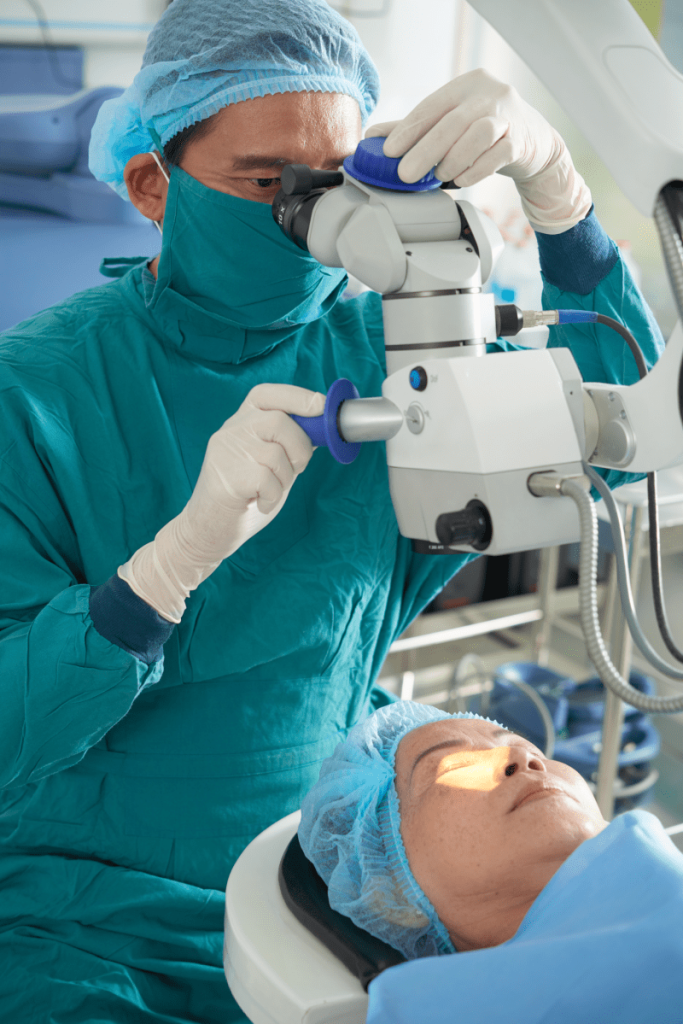
How Long Is The Prohibition On Sports And Swimming After Surgery?
The prohibition on intense sports and swimming activities is generally at least 2 weeks. This period is critical to prevent impact and infection risk in the eye. Light exercises and walks can be resumed after 2-3 days.
What Is The Process For Completely Discontinuing Glasses After Surgery?
The use of glasses for distance vision is generally completely discontinued the day after the surgery. The patient’s visual acuity is measured during the first check-up, and they are allowed to resume daily activities. The only exception is the need for reading glasses after the age of 40 (presbyopia), which is a natural aging process.
What Is Cure Holiday’s Role In The Laser Surgery Process?
Cure Holiday acts as a bridge of trust and organization for patients. It finds the best accredited eye centers suitable for the patient’s needs, manages all logistical processes (VIP transfer, accommodation), and provides uninterrupted translation support. This ensures the patient receives treatment safely and stress-free in Istanbul.
How Is The Control Of Chronic Diseases Mandatory Before Surgery?
The control of chronic diseases like diabetes is mandatory because uncontrolled diabetes slows down wound healing and increases the risk of infection. Physicians control the patient’s blood values before the surgery and postpone the operation until the health status is fully stabilized.
How Long Should Protective Glasses Be Used After Surgery?
The use of sunglasses (UV protected) is absolutely mandatory for at least 1 month during the day to protect the healing cornea from UV rays. Protective shields should be used while sleeping at night, especially in the first week, to prevent the eye from being hit or rubbed.
Which City Is Better For Laser Surgery: Istanbul Or Antalya?
Both Istanbul and Antalya have high-quality, internationally accredited hospitals. Istanbul offers a wider range of specialist physicians and higher case volume, while Antalya better combines treatment with holiday comfort. The decision depends on the patient’s personal preference and budget.
Why Should Turkey Be Preferred For Getting Rid Of Glasses?
Turkey is the most logical choice due to the combination of international standards, high experience of surgeons, and up to 50-70% cost advantage. The packaging of all logistical processes through Cure Holiday allows patients to receive high-quality treatment at the best possible budget.
What Treatments Are Applied For Long-Term Dry Eye Issues?
In long-term dry eye issues, intensive moisturizing eye drops are used. Additionally, special eye drops, punctual plugs (to block tear drainage), or specific oral medications may be applied. The physician manages this condition with a customized treatment plan.
What Should Be Done For Presbyopia (Near Vision) After LASIK?
For Presbyopia (difficulty seeing close up) after the age of 40, solutions include using reading glasses, Monovision technique (one eye corrected for far, the other for near), or Multifocal Intraocular Lens implantation. The physician presents the most suitable option based on the patient’s lifestyle.
Why Is The Laser Brand Used Important?
The brand and model of the laser device (e.g., Carl Zeiss, Alcon) are important because they affect the speed, precision, and level of customization (Wavefront) of the surgery. New generation devices reduce the risk of night vision problems. Reliable clinics use the best international brands.
Why Is Corneal Thickness Measurement Critical Before Surgery?
Corneal thickness measurement (Pachymetry) is critically important because it determines how much corneal tissue can be safely removed. The cornea must remain above a certain safe thickness after the surgery to prevent the risk of keratoconus and ensure stability.
What Is The Success Rate In High Myopia Treatment?
The success rate in high myopia treatment (up to -10 diopters) remains high when Femto-LASIK/Wavefront technology is used and corneal thickness is sufficient. In cases where the cornea is too thin or the prescription is too high, ICL lens implantation, which has a very high success rate, is recommended.
What Is Cure Holiday’s Role In The Laser Surgery Process?
Cure Holiday finds the best accredited clinics, manages all logistical processes (transfer, accommodation), and provides uninterrupted translation support. This ensures the patient receives treatment safely and stress-free in Istanbul and fully benefits from the expertise of Turkey.
